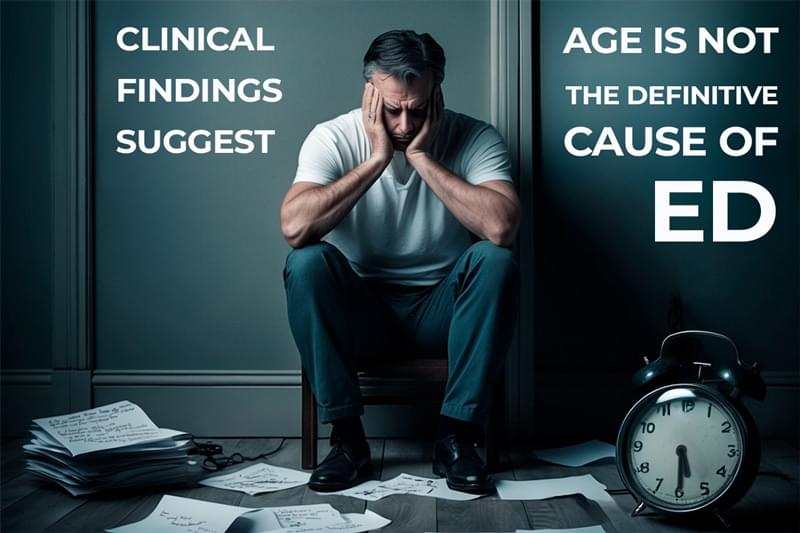Erectile Dysfunction: Myths Vs. Facts Uncovered
Debunking the Age-old Myth of Age Dependency
The common belief that erectile dysfunction (ED) is an inevitable part of aging has long pervaded society's understanding of sexual health. However, recent clinical findings suggest that while the prevalence of ED does increase with age, advancing years alone are not a definitive cause. Scientific studies underscore the multifaceted nature of ED, pointing to a variety of contributing factors that transcend age. Biological mechanisms underlying erectile function, for instance, can be affected by conditions such as cardiovascular disease, diabetes, and hypertension, which do observe higher incidence rates in older populations but are not exclusively bound by the aging process.
| Age Group | Prevalence of ED |
|---|---|
| Under 40 | Approximately 26% |
| 40-49 | 40% |
| 50-59 | 50-60% |
| 60+ | Up to 75% |
Understanding ED as a complex interplay of physiological, psychological, and environmental factors offers a more nuanced perspective. It acknowledges that while the risk of ED may increase with age, it is not solely a function of aging but rather reflects broader health dynamics. This insight is pivotal in shifting the discourse towards a more holistic approach to prevention, diagnosis, and treatment.
Counteracting the age-myth requires medical practitioners and patients alike to adopt a proactive stance towards managing erectile health. Regular screenings for cardiovascular health, maintaining a balanced lifestyle, and addressing mental health issues can significantly mitigate the risk of ED. This contemporary view not only challenges outdated stigmas but also empowers individuals across age groups to seek effective treatments, paving the way for advancements in medical research and therapeutic interventions that promise a brighter future for sexual health.
Unraveling the Truth about Lifestyle's Role
The relationship between lifestyle choices and erectile dysfunction (ED) has long been investigated by the scientific community, offering a crucial perspective on causality and prevention. ED, characterized by the inability to achieve or maintain an erection sufficient for satisfactory sexual performance, is not merely a mechanical issue but significantly influenced by lifestyle factors. Extensive research underscores the impact of habits such as smoking, alcohol consumption, and physical inactivity, elucidating their role in impairing vascular health. The endothelial dysfunction caused by these activities compromises blood flow, a critical element in the physiological mechanism of erections, thus establishing a direct link between detrimental lifestyle choices and ED.
Moreover, the role of diet in the onset and severity of erectile dysfunction cannot be overstated. Diets high in saturated fats and sugars and low in essential nutrients contribute to the development of atherosclerosis, a condition marked by hardened arteries that can significantly diminish blood flow to the penis. Conversely, adherence to diets rich in vegetables, fruits, whole grains, and lean proteins, such as the Mediterranean diet, has been associated with a lower risk of ED. These dietary patterns promote vascular health and overall wellbeing, reinforcing the pivotal role of nutrition in maintaining erectile function.
In addition to physical health, lifestyle factors intimately intertwine with psychological wellbeing, further complicating the landscape of ED. Stress, anxiety, and depression are potent exacerbators of erectile dysfunction, creating a bidirectional relationship where each condition may provoke or aggravate the other. Managing these psychological conditions through holistic strategies that include regular exercise, adequate sleep, and stress reduction techniques can ameliorate the severity of ED. Such approaches underscore the necessity of addressing mental health as part of a comprehensive strategy for managing erectile dysfunction.
The burgeoning field of scientific research continually affirms the consequential role of lifestyle in the context of erectile dysfunction, offering empowering insights for prevention and management. It posits that through informed lifestyle adjustments, individuals can significantly mitigate their risk of developing ED. This evidence-based approach champions the adoption of healthier habits not only as a therapeutic measure post-diagnosis but crucially, as a preventive strategy, painting a hopeful picture for those seeking to preserve their sexual health. In light of these findings, it becomes evident that understanding and modifying lifestyle factors is integral to the holistic management of erectile/sexual dysfunction, elevating it from a mere condition to a modifiable outcome of lifestyle choices.
Prescription Drugs: Culprits or Scapegoats?
The intersection of prescription medications and erectile dysfunction (ED) is a complex, often misunderstood area of healthcare. While it's widely acknowledged that certain pharmaceuticals can contribute to ED as a side effect, it's crucial to navigate this realm with discernment. Medications for hypertension, depression, and other chronic conditions have been implicated in cases of ED, fuelling the perception that prescription drugs are often the culprits. However, this view oversimplifies a multifaceted issue, neglecting the necessity of these medications for overall health management. It's essential to consider the balance between managing a health condition and mitigating side effects, including what is erectile dysfunction.
Moreover, attributing ED solely to prescription drugs overlooks the multifactorial nature of this condition. Research highlights that vascular health, psychological factors, and lifestyle choices play significant roles in the development and persistence of ED. Thus, while medications might contribute to or exacerbate erectile difficulties, it's imperative to assess the broader health picture. Healthcare professionals often engage in medication review and adjustment processes, aiming to minimize adverse effects without compromising the primary treatment's efficacy.
In exploring the scapegoat narrative, it's important to scrutinize the evidence base supporting these claims. Clinical studies and pharmacological research provide insights into how and why certain drugs may influence sexual function. This knowledge empowers patients and clinicians to make informed choices, potentially opting for alternatives with a lower risk of contributing to ED. Patient education around these dynamics is crucial, emphasizing that modification or cessation of a drug regimen should never be undertaken without professional guidance.
The horizon of ED management is witnessing a promising integration of advanced technologies and novel therapeutic approaches, aiming to offer solutions that circumvent the pitfalls associated with traditional pharmaceuticals. Innovations in pharmacotherapy and personalized medicine hold the promise of targeted treatments with minimized side effects, including those affecting erectile function. This evolving landscape underscores the importance of nuanced understanding and research in addressing the complex interplay between prescription medications and erectile dysfunction, steering away from oversimplified blame towards comprehensive, individualized care strategies.
Psychological Factors: More Than Just Mind Games
Understanding the psychological underpinnings of erectile dysfunction (ED) necessitates a nuanced exploration beyond the simplistic attribution to stress or anxiety. Indeed, psychological factors encompass a wide range of emotional and mental health issues, including depression, relationship problems, sexual trauma, and performance anxiety, thereby illustrating the complex interplay between the mind and sexual function. What is often misconstrued as a mere consequence of being preoccupied or not ‘in the mood’, can actually stem from deeper, more ingrained psychological issues. These mental states not only exacerbate ED but can also be its primary cause, indicating the critical need for a comprehensive approach towards diagnosis and treatment.
Delving deeper, scientific investigations have illuminated how neurotransmitters involved in the brain's response to stress and anxiety, such as serotonin and dopamine, can specifically influence erectile function. For instance, anomalies in serotonin levels are closely linked with sexual dysfunction, illustrating how a dysregulated neurotransmitter system can directly impact erectile capabilities. Furthermore, psychological distress contributes to the alteration of blood flow and nerve function, crucial mechanisms in achieving and maintaining an erection. This underscores the physiological consequences of psychological stressors on sexual health.
The treatment of ED, therefore, often incorporates psychological therapies alongside medical interventions. Cognitive-behavioral therapy (CBT) has shown efficacy in addressing the psychological aspects of ED, aiming to reduce anxiety related to sexual performance, and restructuring cognitive distortions regarding sexual intercourse. Psychosexual therapy, an approach focusing explicitly on psychological sexual problems, is also deployed to enhance sexual confidence and alleviate performance pressure.
Recent advancements in understanding the psychological dimensions of ED have led to more holistic treatment paradigms, merging psychological assessments and interventions with traditional medical approaches. This integration is pivotal, as it addresses the multifaceted nature of ED, recognizing that psychological wellness is indissolubly linked to sexual health. As we continue to expand our understanding of the psychological factors contributing to ED, it is evident that tackling these mental barriers is not merely addressing mind games, but is a critical component in the holistic management of erectile dysfunction.
Dietary Supplements: Miracle Cures or Placebos?
Within the complex narrative of managing erectile dysfunction (ED), dietary supplements often emerge as a beacon of hope for many seeking alternatives to conventional pharmaceuticals. Marketed with promises of efficacy and natural benefit, these supplements tout the allure of a "miracle cure". Yet, scientific scrutiny reveals a landscape where empirical evidence is mixed, and the border between therapeutic benefit and placebo hovers ambiguously. Fundamental to understanding their role, it's critical to distinguish between supplements fortified with rigorous research and those predicated on anecdotal efficacy. The active ingredients in some supplements, such as L-arginine, zinc, and ginseng, have been studied for their potential to improve blood flow or hormonal balances that can influence ED. However, the concentrations of these compounds in over-the-counter formulations may vary widely, raising questions about dosage accuracy and overall effectiveness.
The regulatory oversight of dietary supplements, unlike prescription drugs, does not mandate stringent efficacy and safety trials before market release. This regulatory gap underscores a critical consumer caveat: what is marketed may not always meet the promised outcomes for erectile dysfunction management. As such, individuals often navigate a trial-and-error process, potentially delaying more effective, evidence-based treatments. Consumer vigilance and professional guidance stand as pivotal navigational tools in this context, urging a cautious approach to supplementation as a standalone therapy for ED.
The influence of placebo effects in the realm of dietary supplements and ED cannot be underestimated. Psychological factors play a significant role in sexual health, and the belief in a treatment's efficacy can sometimes manifest as tangible improvement in symptoms. This placebo effect, while beneficial in highlighting the mind-body connection in sexual health, further complicates the discernment of true therapeutic value versus psychological uplift.
| Supplement | Potential Benefit | Scientific Support |
|---|---|---|
| L-arginine | Improves blood flow | Moderate |
| Zinc | Supports testosterone production | Low to moderate |
| Ginseng | Enhances sexual function | Moderate to high |
The landscape of dietary supplementation in the context of erectile dysfunction underscores a nuanced interplay between scientific research, regulatory frameworks, and the psychological dimensions of treatment. While supplements offer a potential avenue for improvement, the onus remains on rigorous evaluation and a measured approach, balancing hope with empirical evidence.
Technology and Treatments: the Future Is Now
The realm of medical technology has witnessed exponential growth, bringing to the fore innovative treatments that challenge traditional approaches to erectile dysfunction (ED). Among the latest advancements, low-intensity shockwave therapy emerges as a groundbreaking option, leveraging acoustic waves to enhance blood flow and stimulate the repair and growth of blood vessels in the penile tissue. This non-invasive method proposes a paradigm shift, offering a potential long-term solution for ED by addressing its vascular causes rather than merely alleviating symptoms.
Further along the technological spectrum, the introduction of penile implants represents a quantum leap in therapeutic interventions. These devices, which can be either inflatable or malleable, are surgically inserted into the penile shaft to provide an immediate and controllable erection, offering an option for patients for whom other treatments have failed. The integration of advanced materials and robotic surgery has enhanced the efficacy and safety of these implants, greatly improving patient satisfaction and outcomes.
On the pharmaceutical front, the development of novel drugs continues to expand the arsenal against ED. The exploration of new PDE5 inhibitors, alongside investigations into medications targeting other physiological pathways involved in erectile function, holds promise for more personalized and effective treatments. Innovations in drug delivery methods, such as topical creams and dissolvable films, aim to reduce side effects and increase accessibility, providing patients with more discreet and user-friendly options.
The convergence of biotechnology and digital health tools offers yet another avenue for managing ED. Telemedicine platforms facilitate unprecedented access to specialized care, allowing for discreet, timely, and effective management of the condition. Furthermore, the advent of wearable devices capable of monitoring physiological parameters related to sexual health is on the horizon. These advancements not only promise to enhance the diagnosis and treatment of ED but also empower patients to play a more active role in managing their health. Together, these technologies herald a new era in the treatment of erectile dysfunction, characterized by personalized, efficient, and less invasive options, underscoring a future where the condition can be addressed more comprehensively and effectively.








